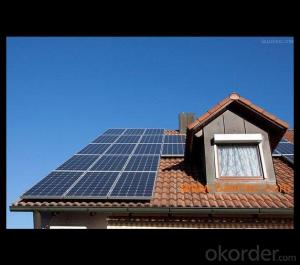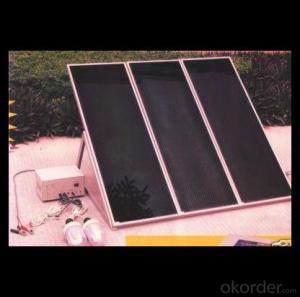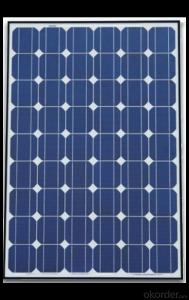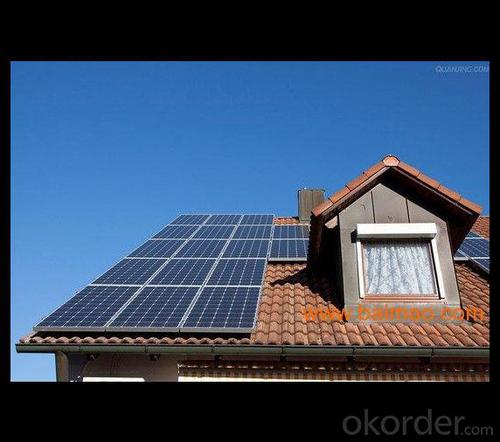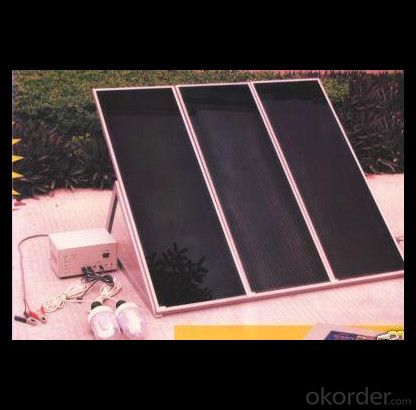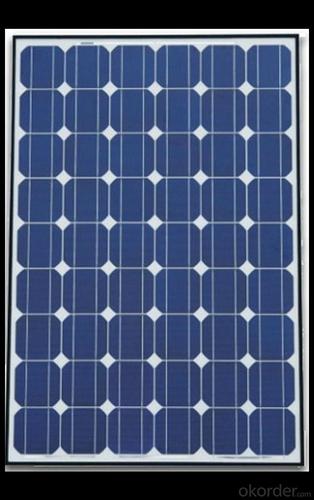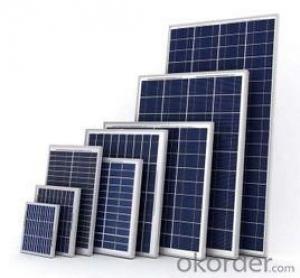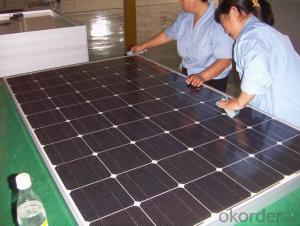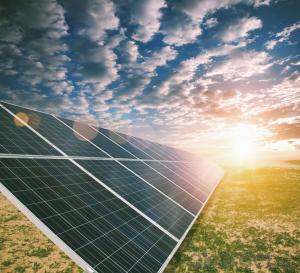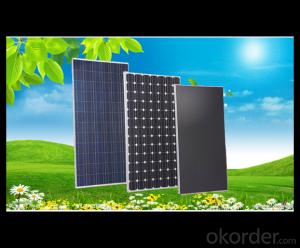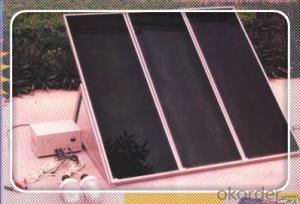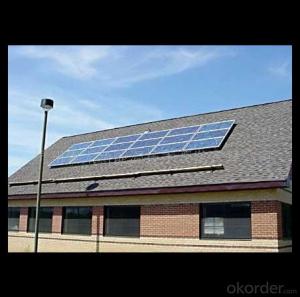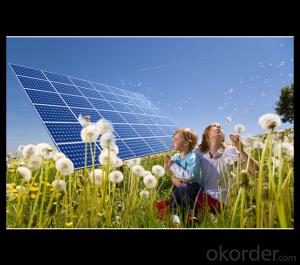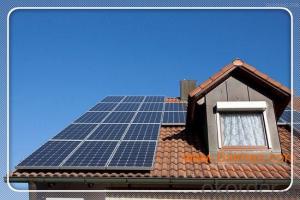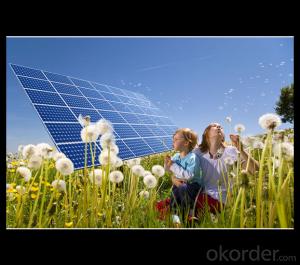Cost Solar Panels:260W Direct Factory Sale Price 240-260Watt Solar Panels
- Loading Port:
- China main port
- Payment Terms:
- TT OR LC
- Min Order Qty:
- 10000 watt
- Supply Capability:
- 100000 watt/month
OKorder Service Pledge
OKorder Financial Service
You Might Also Like
Specification
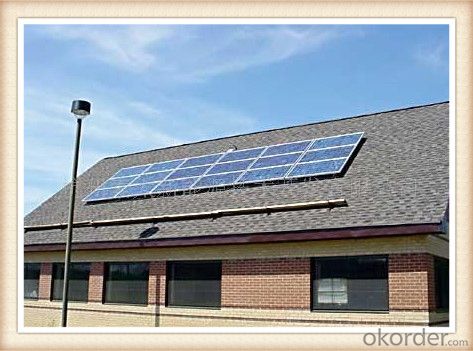
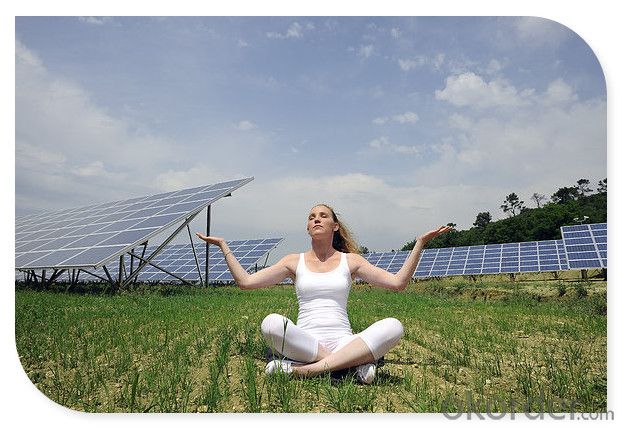
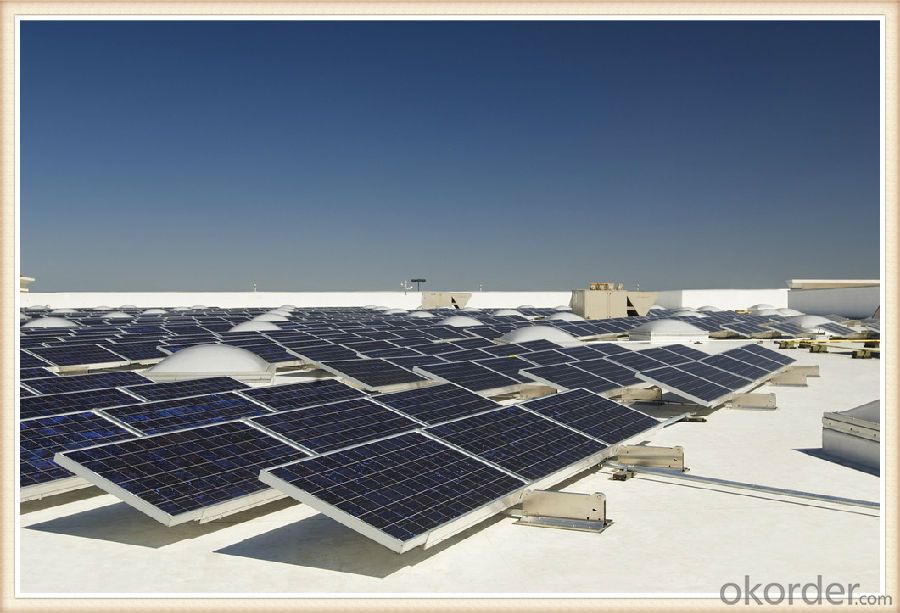
Solar Module Introduction
Solar modules use light energy (photons) from the sun to generate electricity through the photovoltaic effect. The majority of modules use wafer-based crystalline silicon cells or thin-film cells based on cadmium telluride or silicon. The structural (load carrying) member of a module can either be the top layer or the back layer. Cells must also be protected from mechanical damage and moisture. Most solar modules are rigid, but semi-flexible ones are available, based on thin-film cells. These early solar modules were first used in space in 1958.
Electrical connections are made in series to achieve a desired output voltage and/or in parallel to provide a desired current capability. The conducting wires that take the current off the modules may contain silver, copper or other non-magnetic conductive transition metals. The cells must be connected electrically to one another and to the rest of the system. Externally, popular terrestrial usage photovoltaic modules use MC3 (older) or MC4 connectors to facilitate easy weatherproof connections to the rest of the system.
Specification
Model Type | |
Peak Power-Pmax(W) | 5-200W |
Open Circuit Voltage-Voc(V) | 44.2 |
Maximum Power Voltage-Vmp(V) | 36 |
Short Circuit Current-Isc(A) | 5.4 |
Maximum Power Current-Imp(A) | 5 |
Maximum System Voltage | 1000V DC |
Maximum Series Fuse Rating | 10A |
Power Tolerance | -1~+3% |
Temperature Coefficients of Pmax | -0.45%/℃ |
Temperature Coefficients of Voc | -0.348%/℃ |
Temperature Coefficients of Isc | 0.031%/℃ |
Nominal Operating Cell Temperature | 44.5±2℃ |
Standard Testing Condition(STC) | Irradiance:1000W/m²;Temperature:25℃;AM=1.5 |
Qualification Test Parameters | |
Operating Temperature | -40℃~+85℃ |
Storage Temperature | -40℃~+85℃ |
Pressure Bearing | ≥5400Pascal/m² |
Wind Bearing | ≥5400Pascal/m² |
Mechanical Characteristics | |
Cell Size | Mono 125*125mm±0.5 |
No.of Cells | 72pcs(6*12) |
Dimension | 1580*808*40mm |
Weight | 15.5Kg |
Glass | 3.2mm High Transmission,Low Iron |
Frame | Anodized Aluminum Alloy |
Junction Box | IP65Rated |
Internal Diodes | 3 Bypass Diodes |
Cable | 1*4.0mm² Length 900mm |
Images
Packing & Shipping:
We have rich experience on how to pack the panels to make sure the safety on shipment when it arrives at the destination.
The normal size is packed by 25pcs/ carton / pallet. Paper carton for FCL shipping and wood carton for LCL shipping.
Features
1.High reliability with guaranteed -3% to +5% power output tolerance, ensuring return on investment
2.High conversion efficiency based on leading innovative photovoltaic technologies
3.Withstands high wind-pressure and snow load, and extreme temperature variations
4.Attractive appearanceUnique frame design, high mechanical strength, and easy Installation
Warranty:
For c-Si panel: 25years output warranty for no less than 80% of performance, 10 years output warranty for no less than 90% of performance. Free from material and workmanship defects within 5 years.
For a-Si panel: 20 years output warranty for no less than 80% of performance, 10 years output warranty for no less than 90% of performance. Free from material and workmanship defects within 2 years.
•100% product quality protection
•100% on-time shipment protection
•100% payment protection for your covered amount
FAQ:
(1)What price for each watt?
It depends on the quantity, delivery date and payment terms.
(2)What is your size for each module? Can you tell me the Parameter of your module?
We have different series of panels in different output, both c-Si and a-Si. Please take the specification sheet for your reference.
(3)Can you provide the peripheral products of the solar panels, such as the battery, controller, and inverter? If so, can you tell me how do they match each other?
Actually we are only manufacturer of solar panels, but we could try to source them for you in China if you need. We could provide you an optimal system design to instruct you how to install.
(4)Do you have the CE, TUV, UL Certification?
We’ve already passed all the tests, and any certificate is available.
(5)Have you ever sold your products to companies in my country?
Of course, we have customers in all general PV markets, but I think we should expand our market share along with the market growth.
(6)When did your company set up? You are a new company, how can I believe your quality?
We entered into Solar PV industry in 2005, now we have several plants in manufacturing of a-Si and c-Si panels, and our capacity is 220MW per year. Till now we have already passed all the tests by authorized laboratories, e.g. TUV, VDE, UL.
(7)Can you help us install the module if we cooperate with you?
We haven’t entered into installation sector, but we have the plan in near future.
(8) How do you pack your products?
We have rich experience on how to pack the panels to make sure the safety on shipment when it arrives at the destination.
(9) Can you do OEM for us?
Yes, we can.
(10)Can we visit your factory?
Surely, I will arrange the trip basing on your business schedule.
- Q: I am confused. I am planning to build a simple 2Watt solar system to power some lights in my house. . I wonder if it is possible to power up a 2Watt bulb using 2Watt solar power?2. Normally, when we are reading the power rating of a bulb, we will read the wattage, so what about the voltage and current rating?3. If the current is insufficient, will the bulb light up?I am having a solar panel that can output 2W power but I am not sure about the output voltage, how can I find out about the current? I am getting really confused.
- Hey, okorder
- Q: What are the advantages of using solar panels?
- There are several advantages of using solar panels. Firstly, solar panels produce clean and renewable energy, which helps reduce greenhouse gas emissions and combat climate change. Secondly, solar energy is abundant and free, reducing the dependence on fossil fuels and providing a sustainable source of power. Additionally, solar panels can save homeowners and businesses money on their electricity bills by generating their own energy. Finally, solar panels require minimal maintenance and have a long lifespan, making them a cost-effective and reliable energy solution.
- Q: Can solar panels be installed on a metal roof?
- Yes, solar panels can be installed on a metal roof. In fact, metal roofs are often considered an ideal surface for solar panel installation due to their durability and longevity. The sleek, smooth surface of a metal roof provides an excellent mounting platform for the solar panels, and the panels can be easily attached using specialized mounting brackets designed for metal roofs.
- Q: Given that I am going to purchase a solar panel to charge my cell phones and other gadgets, I would like to know what the ammount of power produced by a 6 Watt solar panel is under regular circumstances. (IE partial sun, full sun, cloudy)
- That site tells you somewhat about the cost of solar panels and their MAXIMUM output. Now some who have these panels claim output, in daily terms, 8 times as great as maximum output, which says they are counting on 8 hours of effective sunlight. In California Desert that is sound. You will discover that Ontario Power grid is planning for 3 hours to 4 hours of maximum output . Based on that 3 to 4 hours of maximum output, it would take close to 20 years to recover your cost at the price Ontario pays for solar power. The deal locks you in so that you can not get more money as electricity prices go up, and do not lose if electricity prices go down over that 20 years.
- Q: Pretty much, can solar panel's support the entire houses electrical needs generally, because I know sometimes the owner's can sell unused electricity back, any ideas or any ideas on how much the average home uses in kWh
- why okorder and we will tell you and everyone else what they would need.we will tell you to the dollar what it takes to accomplish your desire.thanks tommy
- Q: I am seriously thinking about installing PhotoVoltais Solar panels (that generate electricity) on my roof. Besides the usual (cost, ROI, etc.), I was researching for the maintenance of these panels. We have tall trees around the house and needles and leaves fall on our roof all the time... not to mention the dirt and grime that collects over time.Do these decrease the capacity of the panels? Do the panels require a regular maintenance?Thanks!
- I don't know if the guy is right about cells burning out if they are covered. You should look on the Internet for insolation tables for your area to see the effective hours of sunlight. Then guesstimate the percentage of time the panels will be shaded. Those trees may make the solar thing a poor idea. He is right about the trees reducing you efficiency. If a panel is shaded about 0 percent, its output drops to close to zero. My panels are five years old, and I have washed them twice. There as been no noticeable dropoff in output.
- Q: Can solar panels be installed on swimming pool covers?
- Yes, solar panels can be installed on swimming pool covers. This innovative approach helps harness the sun's energy to power pool equipment and reduce energy costs. The panels are typically lightweight and waterproof, making them suitable for installation on pool covers.
- Q: I would like to know how do you build a solar panel?
- There are several types of solar panels. If you mean photovoltaic panels for generating electricity, that is a really advanced project that few amateurs are equipped to do. In the long run, it will be a lot cheaper and easier to buy factory made PV panels. You can try building one by sandwiching an array of photovoltaic cells between a sheet of glass or plexiglass and a sheet of aluminum. Remember that this assembly must be able to withstand great heat, and it must be sealed to make absolutely sure it does not leak. So basically, you need to lay out the PV cells and wire them together to get the desired voltage and current, with some arrangement to allow the wires to extend outside without leaking. Then you enclose the panel around all four edges with aluminum channel and seal with silicone sealer. Lay it on thick and test thoroughly with water hoses to eliminate all leaks. As mentioned, it's easier and cheaper to buy them factory made. If you mean a heat collector for a solar house heating system or hot water system, that is just a matter of building a thin, flat aluminum box with a glass lid. For hot air, you just need to circulate the air through the box when the sun is shining. For water, you need to have some arrangement to pass the water through the compartment in thin walled metal tubing. You won't be surprised when I say it's cheaper to buy one factory made. Good luck.
- Q: Can solar panels be used to power a restaurant?
- Yes, solar panels can be used to power a restaurant. By installing solar panels on the rooftop or in a nearby area, the restaurant can generate clean and renewable energy to meet its electricity needs. These panels convert sunlight into electricity, which can power various appliances, lighting, and other electrical systems within the restaurant. Additionally, solar panels can help reduce the restaurant's reliance on the traditional power grid, leading to potential cost savings and environmental benefits.
- Q: I don't remember what number exactly but it's in the single digits. This number represents how efficient solar panels are at capturing the sun's rays and converting it into electricity.Why?
- There are a lot of solar panels available today's. The problem of the efficiency is the proccess of converting, these cells use the photons of the sun to react with the ( Si compound inside the cell) due to the little thing that cell's are only a fraction of these energy is converted, remember that solar cells are paper thin and the really problem of these cells are the voltage not the amps. A single 3x6 inches solar cells can produce 3.6 amps but only 0.5 volts.
Send your message to us
Cost Solar Panels:260W Direct Factory Sale Price 240-260Watt Solar Panels
- Loading Port:
- China main port
- Payment Terms:
- TT OR LC
- Min Order Qty:
- 10000 watt
- Supply Capability:
- 100000 watt/month
OKorder Service Pledge
OKorder Financial Service
Similar products
Hot products
Hot Searches
Related keywords
